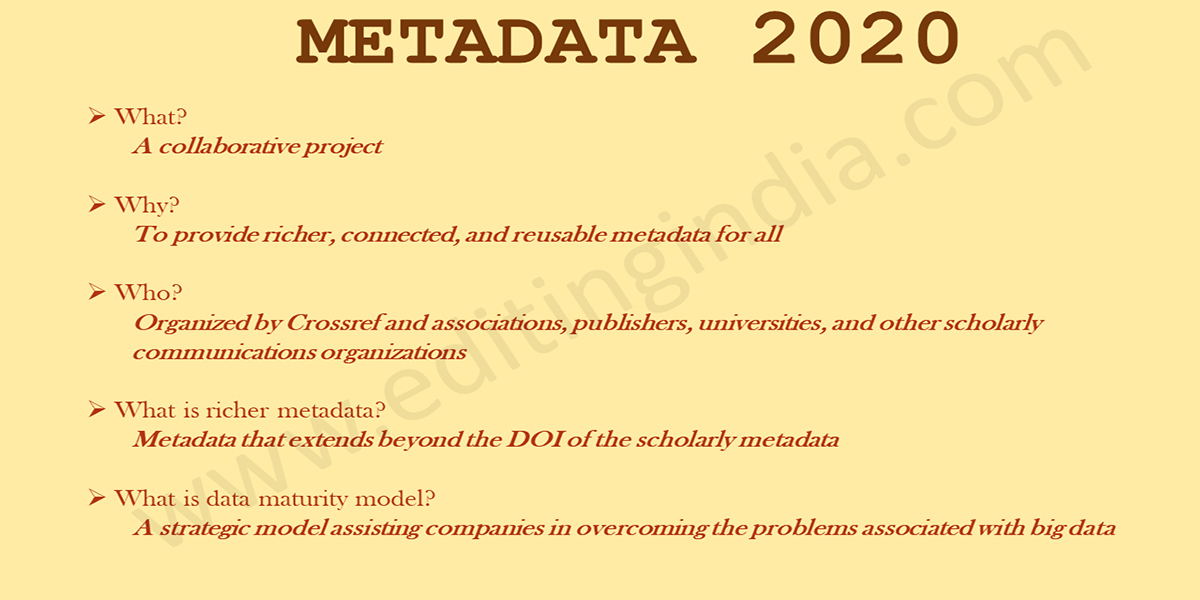Metadata 2020 is a collaborative project that supports richer, connected, and reusable metadata for scholarly and research pursuits. It is defined as the data that provides information regarding other data. This project is organized by Crossref along with associations, publishers, universities, and other scholarly and research communications organizations. Crossref is an official Digital Object Identifier (DOI) Registration Agency of the International DOI Foundation. The primary aim of this project is to create awareness and resources for all entities with a stake in creating and using scholarly and research metadata for scientific and research purposes.
Metadata 2020 is a necessary initiative as richer metadata can drive scientific discovery and innovation. Connected and reusable metadata can bridge the gap between sources and various scholarly and research communities and prevent the replication of research data. As quoted by Ginny Hendricks, the outreach director of Crossref, “Richer metadata should be a high priority for all publishers and stakeholders. It’s not an operational issue but a strategic priority.” Inadequate and incorrect metadata hinders and reduces the possibility of breakthrough research and discoveries. This project involves improving the metadata quality for different publishing aspects, namely journal publications, issues, and article data related to research and academics.
What is richer metadata?
Richer metadata refers to the data that extends beyond the DOI of the scholarly metadata. Furthermore, it refers to the data that includes not only bibliographic details but also provisions such as information regarding the funding source or facilitating copyright of the research and access permission for the research. Richer metadata may also include information regarding the context of the published journals, issues, and article data related to research. For example, Crossref metadata may include information specifying the author’s unique ORCiD, allowing you to find other research or related work by the same person.
Metadata 2020 was introduced in a panel presentation in Washington, DC, at the National Academies of Sciences, Engineering, and Medicine’s symposium. The introduction mentioned the details regarding the goals of this collaborative project along with the challenges experienced by stakeholder groups that create and manage the research and scholarly metadata. In addition, the presentation team expressed a desire to establish a data maturity model.
What is data maturity model?
Data maturity model is a strategic model that can assist companies in overcoming the problems associated with big data. This model helps convert data into information, which can eventually be converted into knowledge. Data maturity basically has five stages, namely no usable data, big data, the right data, predictions, and strategy. The base of this model is a company with little or no useful data. However, it is a theoretical base because practically such companies do not exist. Companies at the second stage, big data, have a steady flow of data from both internal and external sources. These companies require a few tools to convert this data into information. Companies at the third stage use high-quality data by applying relevance and context to the data. This stage can be achieved by implementing a cultural and technological shift. Prediction and strategy are the fourth and fifth stages in this model. Companies in the fourth stage can conduct predictive analysis to predict customer and market demands, while companies in the fifth stage build their business model on the basis of its analytical models. Thus, the data maturity model can strategically assist in data management. Implementing such a data maturity model for the metadata will contribute in the effective management of research-related data.
However, at the end of the day, metadata is not the goal, rather a means to achieve efficient scholarly and research publications and catalyze scientific discovery. Thus, it is essential to keep an eye out for details and ensure that payoffs are bigger than the time and labor being poured into the Metadata 2020 project.
References
1. When It Comes To Richer Metadata, Know What You Don’t Know by Paula Reeves
2. Telling Others About Metadata 2020, Networking, and Learning a Lot Along the Way by L.K. Williams and Scott Wymer
3. Big Data: Turning Data into Knowledge and Putting Knowledge to Work by Markus Sprenger

